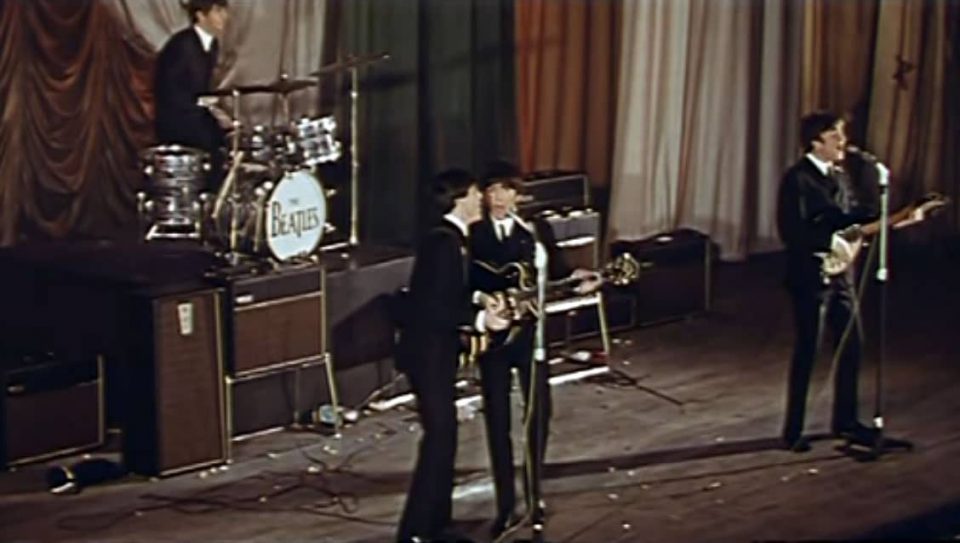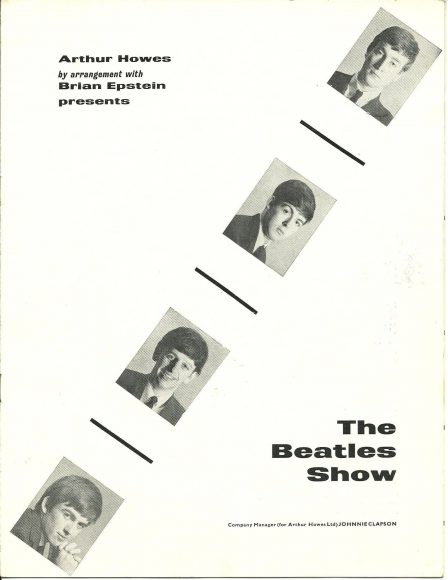The Beatles performed two shows at Manchester’s ABC Cinema on the 16th date of their 1963 Autumn Tour.
During the first show, Pathé News filmed the group performing She Loves You and ‘Twist And Shout’. Accompanied with backstage footage and crowd scenes, this became an eight-minute cinema feature entitled The Beatles Come To Town, shown for a week from 22 December 1963.
The backstage area was also filmed by a crew from Granada TV, who also interviewed The Beatles about their forthcoming US tour. The footage was first broadcast in the 6 January 1964 edition of Scene At 6.30.
BBC radio journalist Michael Barton was also at the venue, and interviewed The Beatles for the Voice Of The North show, broadcast on the North Home Service that evening from 6.10-6.30pm. Barton also interviewed George Harrison separately for another show, Wacker, Mach Schau, about the links between the Liverpool and Hamburg music scenes, which was broadcast on 27 November from 8pm.
Also present was Derek Taylor, then a reporter for the Daily Express. Taylor had become a huge Beatles fan after first seeing them in Manchester on 30 May 1963, and later worked for them at NEMS and Apple.
On 20 November, The Beatles came to the Apollo, Ardwick, and I was there with Joan’s sister Diane, then 16; Joan was more than eight months pregnant, and a Beatle concert in that phase of their career was no place for a woman in that phase of pregnancy. This seventh appearance in Manchester, their second in six months, was treated by press, television, police and fans as an occasion of enormous importance; and in the final paragraph of the purplest review I ever wrote, I concluded: ‘It is, quite simply, the ultimate phenomenon of showbusiness.’ It was a statement both grandiose and factual. The whole report is printed below, just as it was telephoned through after the first ‘house’ (for in those days all concerts were twice nightly):Beatlemania, in its sobbing, throbbing extremities, gripped Manchester last night.
It captivated the teenagers of the city and far beyond. It drew 5,000 of them inside the Apollo Cinema to share the thumping ecstasy of their electronic excitement. It tore half the city’s police force – men and women – from normal duties. It totally mobilised the first-aid resources of South Lancashire – men and women, even earnest children.
At noon in a curiously apprehensive atmosphere, in places far from the Apollo, plans were rehearsed. St John’s paraded their staff with first-aid kits. So did the Red Cross.
The police were given their final orders. A mobile headquarters – last used in a murder hunt last month – was set up outside the cinema.
The lads themselves, Ringo Starr, George Harrison, Paul McCartney and John Lennon, still trying to regard themselves as everyday Liverpool entertainers, were ploughing towards Lancashire from Wolverhampton where they appeared on Tuesday.
Outside the theatre, at lunchtime, the teenage vigil began. Small knots of leather-clad girls gathered.
By early afternoon there were 200 of them. Few had tickets for last night’s two-house show. They all went in four desperate hours weeks ago when mounted police were called in to suppress riots.
Where there’s a crowd, there’s a tout. The Apollo had dozens. Selling pictures and books and souvenirs. Most at 2s. 6d., mostly sold by men who were in the same spot ten years ago when Johnny Ray was the draw, eight years ago when it was Bill Haley, or this May when it was Cliff Richard.
The Beatles themselves, dressed as Beatles, looking like Beatles, slid quietly into the cinema in mid-afternoon. No policemen’s uniforms this time. That sort of game can be played only once.
They faced a battery of cameramen which would frighten Krushchev. Tier on tier of flashbulbs flashed. Newsreel cameras whirred, television cameras gently hummed.
It was all Christian names. ‘Look this way, George.’ George looked.
‘John, pull Ringo’s hair.’ The languid Lennon, blandest Beatle of them all, pulled. And Ringo, plain mournful little Ringo, looked pained for the cameras.
‘Fall off a chair, Ringo.’ Ringo fell.
Do they mind? Have they any conception of the Beatlemania? Do they know they will be discussed in the House of Commons today?
The answer is no, they don’t mind. ‘It’s part of the game,’ said George. ‘We like it. It’s great.’
And no they haven’t any idea of their status. ‘We’re just singing and playing and enjoying ourselves. We’re not important really. We don’t recognise ourselves when we read about ourselves.’
And yes, they know an M.P. is to ask that police protection be withdrawn. George doesn’t like that. ‘It’ll mean that people will get hurt.’
The lads don’t want that. But they claim they don’t cause the hysteria. ‘We just arrive, sing and play and go,’ said George. ‘The fans do the rest. We love them.’
Did the fans love them last night?
I have never seen anything like it. Nor heard any noise to approximate the ceaseless, frantic, hysterical scream which met the Beatles when they took the state after what seemed a hundred years of earlier acts.
Compere Frank Berry abandoned any pretence at announcements. He postured in Beatles postures, gestured, shrugged. The screams grew louder. Many acts came and went.
All very good, all marking time, because no one had come for anything other than the Beatles…
Then the curtains parted and the dark-suited Liverpool lads bashed their guitars into their first number.
The theatre went wild. First-aid men and police – men in the stalls, women mainly in the balcony – taut and anxious, patrolled the aisles, one to every three rows.
Many girls fainted. Thirty were gently carried out, protesting in their hysteria, forlorn and wretched in an unrequited love for four lads who might have lived next door.
The stalls were like a nightmare March Fair. No one could remain seated. Clutching at each other, hurling jelly babies at the stage, beating their brows, the youth of Britain’s second city surrendered themselves totally.
It is, quite simply, the ultimate phenomenon of showbusiness.
Fifty Years Adrift
As with each of the concerts on the Autumn Tour, The Beatles performed a 10-song set in Manchester: ‘I Saw Her Standing There’, ‘From Me To You’, ‘All My Loving’, ‘You Really Got A Hold On Me’, ‘Roll Over Beethoven’, ‘Boys’, ‘Till There Was You’, ‘She Loves You’, ‘Money (That’s What I Want)’ and ‘Twist And Shout’.
This was the first of three occasions on which The Beatles performed at the ABC Cinema. The others were on 14 October 1964 and 7 December 1965.
What didn’t get into the Daily Express report of 21 November 1963 was a conversation I had with George and a view of what it was like to be recognized by Paul, a month and a week after our first encounter amid misdirected enthusiasm in Southport. Inside the press conference preceding the Apollo show, I had moved around in what I saw as my pleasantly anonymous way; yet I was recognized immediately when I came face to face with Paul McCartney – already a very famous visual collage of eyes and hair but as yet, for me, lacking a separate personality. For us sporadic raiders of their lives, it was a case of ‘seen one, seen ’em all’, though of course this was not the case with their fans. Pressmen are usually slow in such matters; living as they do in the irony tower, the sceptic tank, the wish-bowl of national journalism, how could it be otherwise?‘You! Oh, oh!’ Paul said, not unpleasantly. ‘Hello again.’ I greeted him with what I assumed was a shy smile and asked him how he was. ‘Great,’ he replied before being swept onward by the crush of photographers and journalists. He waved goodbye in that ‘I am giving you all my attention way for which he has an inborn gift. He was and is a master of communication, unbeatable at personal attentiveness, whether on a one-to-one basis or in front of 50,000 people. Then, through a crowd of bobbing moptops, I saw George for the first time that afternoon. Glancing up from the autograph he was signing, he gave me a friendly grin: ‘Hello. Aren’t you Daily Express?’ Yes. ‘I thought I recognized you.’ We exchanged pleasantries as he continued to sign autographs. He told me that they had a new single coming out in about ten days: ‘I Want To Hold Your Hand’. I said it was good to have The Beatles back in Manchester, and asked him if they were still living in Liverpool. ‘Yes. We still live at home, more or less.’ I wanted to tell him I came from Liverpool; to relate in some broader way, beyond pop-star-meets-pressman; but there was no time – nor, if it came to that, was there any point. I thanked him for stopping, wished him a good show and the best of luck with the single and was about to pass on towards John and Ringo when he said: ‘Nice to see you again.’ ‘I’ll give you a good write-up,’ I said. (The classic cliché, with which every journalist is familiar in its Imperative Mood: ‘Give us a good write-up.’) George laughed and moved on, still signing autographs as he went.
Fifty Years Adrift
Also on this day...
- 2011: Ringo Starr and his All-Starr Band live: Chevrolet Hall, Olinda
- 2009: BBC screens Paul McCartney’s Children in Need appearance
- 2009: Ringo Starr and Paul McCartney to reunite? Y Not!
- 2005: Paul McCartney live: American Airlines Center, Dallas
- 1981: UK album release: Stop And Smell The Roses by Ringo Starr
- 1974: George Harrison live: St Louis Arena, St Louis
- 1968: Paul McCartney is interviewed for Radio Luxembourg
- 1966: Brian Epstein holds a party for The Four Tops in London
- 1964: John Lennon films a sequence for Not Only… But Also
- 1962: The Beatles live: Floral Hall, Southport
- 1960: The Beatles live: Kaiserkeller, Hamburg
Want more? Visit the Beatles history section.


